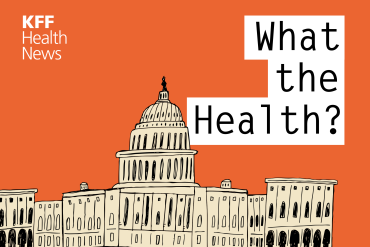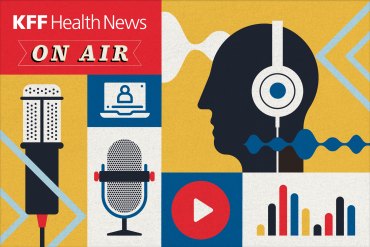Aumenta la desinformación sobre el sarampión, y las personas le prestan atención, dice una encuesta
Mientras se expande la epidemia de sarampión más grave en una década, las creencias falsas sobre la seguridad de la vacuna contra esta infección se diseminan, avaladas por el funcionario de salud de mayor rango del país.
On Autism, Kennedy Turns Against Science and Reality
During his first news conference as Health and Human Services secretary, Robert F. Kennedy Jr. on April 16 ticked off things he thinks kids with autism will never do, including paying taxes, holding a job, and going on a date. Kennedy’s comments go against science and reality.
‘MAHA’ Faithful Impatient With RFK Jr. as He Leads Trump’s HHS
Get our weekly newsletter, The Week in Brief, featuring a roundup of our original coverage, Fridays at 2 p.m. ET.
What the Health? From KFF Health News: On Autism, It’s the Secretary’s Word vs. the CDC’s
Tensions between Robert F. Kennedy Jr. and his employees at the Department of Health and Human Services are mounting, as he made a series of claims about autism this week — contradicting his agency’s findings. Plus, President Donald Trump unveiled an executive order to lower drug prices as his administration explores tariffs that could raise them. Shefali Luthra of The 19th, Jessie Hellmann of CQ Roll Call, and Anna Edney of Bloomberg News join KFF Health News’ Emmarie Huetteman to discuss these stories and more. Plus, KFF Health News’ Julie Rovner interviews two University of California-San Francisco researchers about an upcoming Supreme Court case that could have major ramifications for preventive care.
RFK Jr. Struggles To Navigate Frustrated Supporters and a Demanding Boss
Leaders of the “Make America Healthy Again” movement cheered the ascent of Robert F. Kennedy Jr. to Health and Human Services secretary, but their wish list is far from being realized.
Beyond Ivy League, RFK Jr.’s NIH Slashed Science Funding Across States That Backed Trump
A KFF Health News analysis underscores how the terminations have spared no part of the country, politically or geographically. Of the organizations that had grants cut in the first month, about 40% are in states President Donald Trump won in November.
Magic Happens When Kids and Adults Learn To Swim. Tragedy Can Strike if They Don’t.
A swim team in North St. Louis combats the public health threat of drowning — especially among Black children and adults — by promoting water safety not just for its athletes but also their parents.
Journalists Delve Into Effects of Deep Federal Cuts on Public Health
KFF Health News journalists made the rounds on national and local media recently to discuss topical stories. Here’s a collection of their appearances.
What the Health? From KFF Health News: The Dismantling of HHS
A week into the reorganization of the Department of Health and Human Services announced by Secretary Robert F. Kennedy Jr., the scope of the staff cuts and program cutbacks is starting to become clear. Among the biggest targets for reductions were the nation’s premier public health agencies: the Centers for Disease Control and Prevention, the […]
RFK Jr.’s Purge of FOIA Staff at FDA Spares People Working on Covid Vaccine Lawsuits
A purge of FDA staff spared some people tasked with responding to a judge’s orders to disclose government records on covid vaccines, according to agency employees. The FOIA litigation was brought by Aaron Siri, an ally of Health and Human Services Secretary Robert F. Kennedy Jr.’s who represents anti-vaccine interests.
Los trabajadores de las industrias láctea y avícola han representado la mayoría de los casos de gripe aviar en el país, y prevenir y detectar los casos entre ellos es clave para evitar una pandemia.
Misinformation About Fentanyl Exposure Threatens To Undermine Overdose Response
Fentanyl overdoses occur from ingesting the synthetic opioid. But popular culture has misrepresented the risks to first responders.
Trump’s Immigration Tactics Obstruct Efforts To Avert Bird Flu Pandemic, Researchers Say
Preventing and detecting bird flu infections among farmworkers is a key defense against a potential pandemic. Immigration raids and threats have undermined these efforts, researchers say.
Se cancelan clínicas de vacunación por recortes federales, mientras aumentan los casos de sarampión
Los esfuerzos de inmunización en todo el país se vieron afectados después que los Centros para el Control y Prevención de Enfermedades cancelaran abruptamente $11.400 millones en fondos relacionados con covid-19 que se usaban para muchas vacunas.
This Bill Aims To Help Firefighters With Cancer. Getting It Passed Is Just the Beginning.
Amid the Los Angeles wildfires, California’s U.S. senators cosponsored legislation that would provide support to first responders who develop or die from service-related cancers. But those involved with similar efforts say the road to implementation is rough and paved with long waits, restrictive eligibility requirements, and funding issues.
Rural Hospitals and Patients Are Disconnected From Modern Care
Technological gaps handicap rural hospitals as billions in federal funding to modernize infrastructure lags. The reliance on outdated technology and piecemeal systems challenge staffs and erode patient care.
Slashed Federal Funding Cancels Vaccine Clinics Amid Measles Surge
Federal funding cuts, though temporarily blocked by a judge, have upended vaccination clinics across the country, including in Arizona, Minnesota, Nevada, Texas, and Washington state, amid a rise in vaccine hesitancy and a resurgence of measles.
For Opioid Victims, Payouts Fall Short While Governments Reap Millions
Pharmaceutical companies accused of fueling the nation’s opioid crisis are paying state and local governments billions of dollars in legal settlements. But how much are victims who suffered addiction and overdoses getting?
Public Health Risks of Urban Wildfire Smoke Prompt Push for More Monitoring
As the fires burned in Los Angeles, scientists and local air regulators deployed monitors to measure the levels of heavy metals, carcinogens, and other toxic substances released into the air when homes, buildings, and cars burned. They hope their efforts will inform ongoing cleanup efforts and protect the public in future fires.
Hit Hard by Opioid Crisis, Black Patients Further Hurt by Barriers to Care
The rate of overdose deaths from opioids has grown significantly among Black people. Yet, even after a nonfatal overdose, this group is half as likely to be referred to or get treatment compared with white people. Advocates and researchers cite implicit bias, insurance denials, and other systemic issues.
























